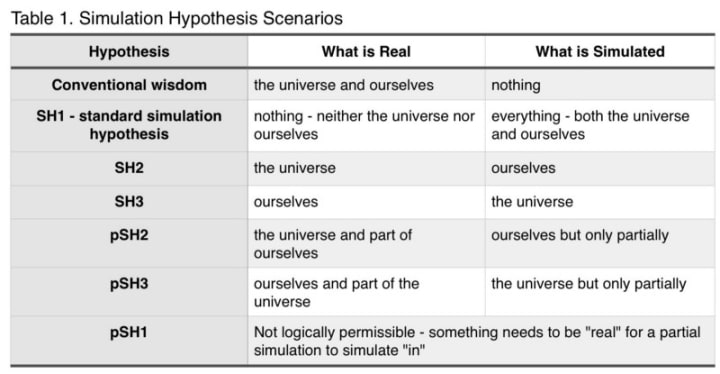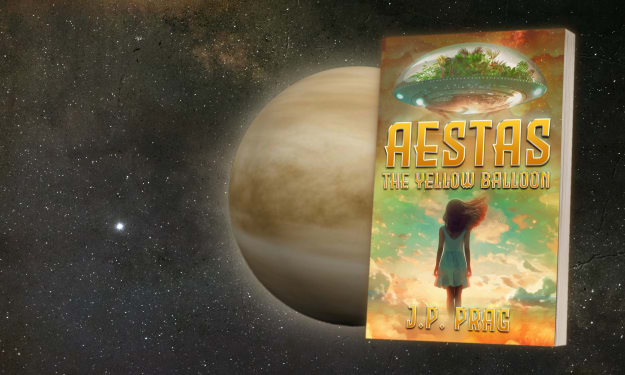The Simulation Hypothesis and Possible Variants
A lot More Thoughts on the Simulation Hypothesis

In the most common and discussed version of the simulation hypothesis all of reality is nothing more than an ultra sophisticated computer program. This includes not only everything that makes up what we consider to be the universe but also ourselves. We exist in the simulation and are also simulated beings. I will call this protypical version of the simulation hypothesis SH1. (pretty imaginative for a simulation right?) There are a few possible variants of SH1 that we might imagine.
For instance let us consider a simulation hypothesis called variant 2 (SH2) in which it is postulated that the universe is totally and completely real. It, in point of fact exists, and it has the very properties we humans have thus far in our short existence ascribed to it. No doubt it has other undiscovered or even unknowable properties as well but that is immaterial to this discussion. In SH2 the universe is real but we are still simulated beings. An intelligence more vast then we can even begin to comprehend, that exists in our real universe and is quite real him/her/them/other self/selves has for reasons unknown or unknowable created us as a race of simulated beings to “move around”, “act”, and “exist” in the real universe.
Now consider another alternative, simulation hypothesis variant 3 (SH3). SH3 is essentially the inverse of SH2. We are in fact real, living, actually existing beings but all that we experience of “the universe” is a simulation. This is most akin to the situation in the movie The Matrix. Similar to the movie premise we could imagine an alien race that keeps us forever enslaved for some nefarious or even for a higher good purpose. We live as embodied real animals but totally controlled by this alien power. The simulated reality is projected directly into our minds and it is all that we ever know or will ever know.
We might also imagine slight modifications of each of the above simulation hypotheses whereby the illusory/simulated portion of “reality” or “ourselves” is only partial. For example take the case of SH2 where we are simulated beings living in “actual” reality, but make actual reality partially simulated. We could make it 1% or 99% simulated it really does not matter. The point is that a modified SH2 with partial simulation is possible. The same could be said for SH3. Could it be said for SH1? (I believe that is a logical impossibility, see below for more on this).
To summarize, let us hypothesize pSH2–3 where the p stands for partial and indicates that the portion of the hypothesis postulated as “real,” the non-simulated portion could in fact be partially simulated to any degree, from just barely simulated to almost entirely simulated.
You might object and say that’s impossible. How could a real, living being be partially simulated? First I would ask you to consider why this scenario seems any more implausible or impossible than SH1–3 as described. Any being powerful enough to create a fully simulated universe with fully simulated beings should have the power necessary to do less than that if they so chose. What about the case of SH1? Is a partial option possible in this most conventional of cases? I believe that a partial simulation option is not logically permissible for SH1. Remember in SH1 nothing is real, everything is simulation. There is no such thing as a part of nothing. In order for something to be partially simulated there must be some reality for it to partially simulate “in” or “into.” Therefore we shall restrict our partial simulation options to SH2 and SH3. The logical impossibility of a partial simulation option for SH1 may be why the idea of partial simulations has not generated more discussion in the philosophical literature on this topic. Remember that SH1 is by far the most common and widely debated simulation hypothesis.
Confused yet? I have broken all of these variants down into tabular format for easier digestion.

Where do we go from here? What would be the consequences if any of these variant scenarios were/are in fact the case? Here I come back to Martin Rezny and his challenge to science and scientists to design and run experiments that test the simulation hypothesis directly. He broached the topic most recently in his discussion of meaningful coincidences. In that piece and discussion with me he correctly points out that while much scientific work has been done in the area of coincidences, none of it accepts the possibility of meaningful coincidence as a “real” option. All of the math, statistics, psychology, etc. work that has been done instead assumes essentially total and absolute randomness (I am simplifying massively here as randomness is an entire area of mathematical study and there are a host of definitions of it) in terms of the operations of the universe and ourselves as actors in it. Obviously in a simulated universe randomness is not a given and even the smallest events could be modified intentionally (e.g. as part of a simulation designer experiment), or unintentionally (e.g. as a defect in the program/simulation). The bottom line is that proof of meaningful coincidence (as defined by Rezny) would add massive support to the standard simulation hypothesis (SH1). At the very least it would suggest that not only is SH1 possible it is also highly probable. I am going to suggest but not discuss in detail in this piece that it would do the same thing for any of the simulation variants discussed above.
At this point I have given up on the possibility of designing any experiment(s) that accept meaningful coincidences as possible and thus might test for them directly. Unfortunately this means that even indirect evidence for the likelihood of SH1 being the case seems out of reach. However, it is my hope that by focusing on one of the alternative simulation hypotheses discussed here we might find a different way to tackle the problem. At the moment such an alternative approach has not occurred to me. It is possible that all I have done is to confuse the issue with semantic “games” and no real illumination is provided. While I can’t refute that possibility definitively I can offer up these thoughts so that greater minds then mine might make some progress with them.
.
About the Creator
Everyday Junglist
Practicing mage of the natural sciences (Ph.D. micro/mol bio), Thought middle manager, Everyday Junglist, Boulderer, Cat lover, No tie shoelace user, Humorist, Argan oil aficionado. Occasional LinkedIn & Facebook user






Comments (1)
Nice writeup. pSH2 seems the most plausible.